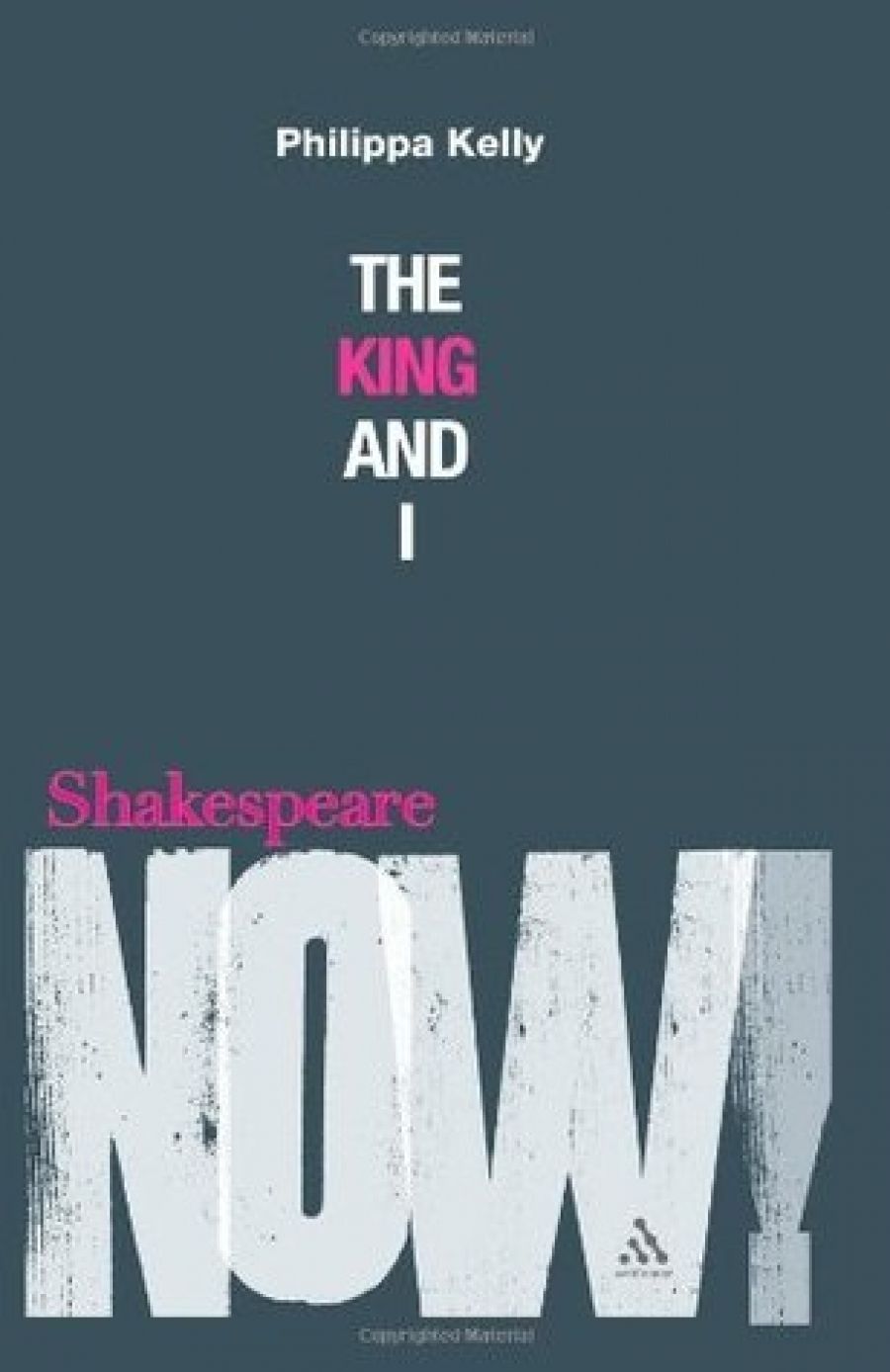
- Free Article: No
- Contents Category: Literary Studies
- Custom Article Title: R.S. White reviews 'The King and I'' by Philippa Kelly
- Review Article: Yes
- Online Only: No
- Custom Highlight Text:
Literary critics used to adopt a persona claiming disinterested separation from the text being analysed. Critical theory, in particular post-colonial and gender studies, eroded this stance, showing that criticism is always self-interested, concealing or inadvertently revealing tacit assumptions stemming from the critic’s biography, class, gender, and political persuasions. As a result, it is common nowadays for critics to be more self-aware about their own value systems. In some ways, this returns us to a Romantic understanding of interpretation reflected in Hazlitt’s ‘It is we who are Hamlet’, Coleridge’s ‘I have a smack of Hamlet myself, if I may say so’, and Keats’s ‘axioms in philosophy are not axioms until they are proved on the pulses ... you will know exactly my meaning when I say, that now I shall relish Hamlet more than I ever have done’.
- Book 1 Title: THE KING AND I
- Book 1 Biblio: Continuum (Palgrave Macmillan), $42.95 pb, 128 pp, 978441111647
Philippa Kelly goes even further, taking as her brief the line from King Lear, ‘Speak what we feel, not what we ought to say.’ In an honest and irreverent way, by turns hilarious and painfully candid, she uses her involvement in our times and in Shakespeare’s text to demonstrate evolving experience of Shakespeare’s play, which has become for her ‘a kind of furniture for the mind’. Not only that, she argues, but her nation, Australia, has been shaped by attitudes raised in Lear that have the potential to reflect Australia’s past and present from colonial to post-colonial status: ‘This book is, necessarily, more than an individual story: it is also my take on a tale of national identity, of a country’s wit, crises, and, at times, shame.’
The plan is executed with unobtrusive integrity, in both the formal and ethical senses of that word. For such an original approach, the book, at just over one hundred pages, is remarkably concise, readable, and penetrating.
Kelly speaks (and it is a speaking voice, by turns confiding, hesitant, indignant, grieved) as somebody steeped in the detail of King Lear. She describes her path from enthralled school student in the 1970s, later teaching the play to resistant army cadets, to respected critic of the play and editor of a standard edition, resident dramaturge in a prison, and now at the Californian Shakespeare Theater company. With these impeccable academic and theatrical qualifications, Kelly invites professional respect, but more compelling are the diversity of experiences and intense moral seriousness that drive the book.
At the personal level, Kelly takes her own family and teenage culture in rural Queensland to represent Australian families, reminding us that Lear is a play about a patriarch ‘four score year and upward’ entering senile dementia, ‘not in [his] perfect mind’, and that the dynamics between his three daughters, who exhibit sibling behaviours of giving and witholding love, are (the pun is apt) ‘familiar’ still. It is my own intrigued observation that King Lear, more even than Hamlet, is the Shakespeare play that Australian critics and theatre companies, such as John Bell’s, whose productions are compared, have most often dealt with. This makes me think that Kelly’s preoccupation is also unexpectedly representative.
The play presents social, ethical, and political themes intensely relevant to modern times. Aborigines and applicant refugees are scapegoated and disempowered victims of our history, the ‘Poor naked wretches’ in Lear, suffering like pariahs on versions of barren heaths and raising acutely the question ‘What is a person worth?’. Political satirists Barry Humphries and the ABC’s ‘Chasers’ perform the role of Lear’s ‘all licens’d Fool’ in their subversive, critical humour; while our political history reveals many cruelly authoritarian actions like those of Lear, Cornwall, Goneril, and Regan, as well as uncomfortable truth-telling like Cordelia’s and this book’s. One example Kelly does not mention is the horrifying similarity between the torture and blinding of Gloucester and the shameful events at Abu Ghraib prison in Iraq. Such abiding questions of justice and injustice, central to King Lear, lie at the heart of The King and I.
Some will ask how far we can ‘use’ or appropriate a play by Shakespeare to comment on our own lives and society. One answer is that people constantly do just this anyway, as evidenced by a surprising number of explicit quotations from politicians and commentators, columnists in the Sydney Morning Herald and elsewhere. I have even heard an AFL football commentator use the phrase ‘Aye, every inch a king’ to describe a player who, unfortunately, was subsequently prosecuted for domestic violence. Succession is a touchy matter. Margaret Thatcher was likened in the press to Lear, while ageing executives such as Rupert Murdoch have been described as Lear-like in devolving the burden of their billions to grateful or ungrateful offspring. More seriously, problems of the elderly, especially in rural communities, are labelled ‘the King Lear syndrome’, and Gloucester has been linked with painful contemporary issues surrounding suicide. However, the deeper justification implied by Kelly throughout is that if we cannot, or do not, see timely mirrorings around us, the play would not still be performed, taught, or read.
Befitting its inclusion in a series entitled ‘Shakespeare Now’, and written with wry humour, humanity, and passion, this concentrated and beguiling book not only opens up fresh ways of making the play relevant to students, but also points towards challenges in understanding and valuing Shakespeare today. It is we who are King Lear.


Comments powered by CComment